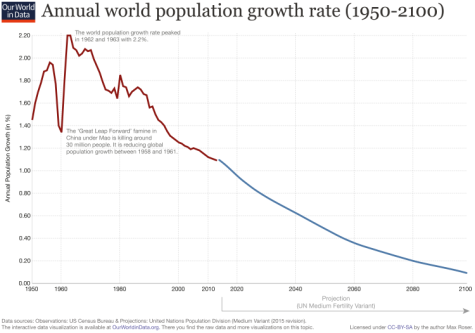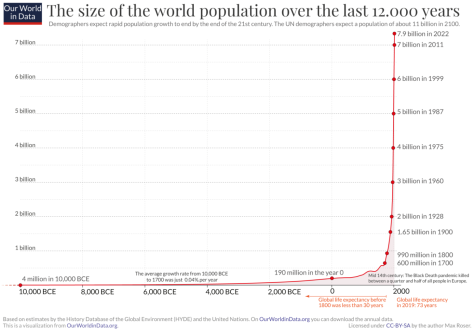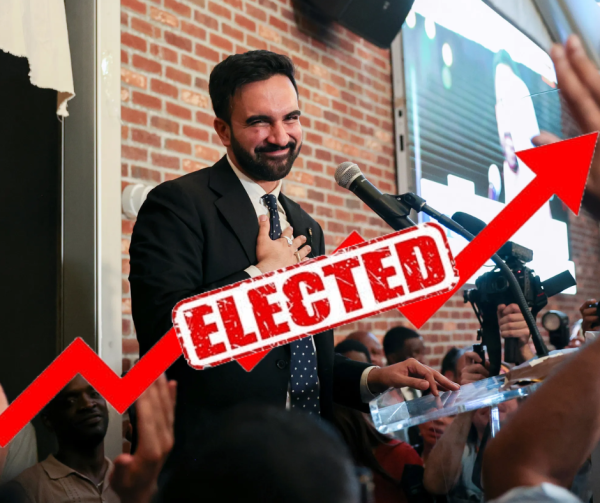An important update on the population crisis
The world population is set to reach a whopping 8 billion by November 15, 2022. This marks a momentous milestone in the history of humanity, especially considering the population was only half this size just under 50 years ago. However, experts predict that this rapid increase in population won’t be lasting very long.
Right now, the human population of Earth is around 7.98 billion. It has been exponentially rising since the 18th century, starting at 600 million in 1700, growing to 990 million in 1800, 1.65 billion in 1900, 6 billion in 1999, and now almost 8 billion. Despite wars, diseases, natural disasters, etc., humans have consistently continued to evolve, leading to such an increase in our numbers.

Many things have been done by countries around the world to try limit the number of people in the world. A famous example is China’s one-child policy which forced parents to limit their families to just one child. According to the IZA World of Labor, this move “significantly curbed population growth,” although it is also associated with an “unbalanced sex ratio, increased crime, and individual dissatisfaction toward the government.”
Nevertheless, even without such policies, experts believe that the human population will actually stop growing relatively soon. Data from the United Nations suggests that our growth rate is already at its lowest point since 1950 and is steadily continuing to decline. The population as a whole is projected to cap off at “10.4 billion people during the 2080s and to remain at that level until 2100” (United Nations). This is in large part because of falling fertility levels around the world.
The organization’s findings regarding fertility levels have found that in “1990, the average number of births per woman was 3.2. By 2019 this had fallen to 2.5 births per woman and, by 2050, this is projected to decline further to 2.2 births”(United Nations). In order to keep the population afloat, “a fertility level of 2.1 births per woman is necessary to avoid national population decline over the long run (in the absence of immigration),” the article mentions (United Nations).

There are several important impacts of all of this. For one, this data means that our population will start to age. The World Economic Forum explains that, “Lower fertility rates, coupled with increased life expectancies around the world, are creating an aging population.” This in turn could, “ultimately lead to an economic slowdown if countries don’t prepare and alter their pension systems accordingly, to account for our aging population” (World Economic Forum).
Another effect in this decline in fertility levels is that it also means that less people are now finding meaning in creating a family. “Trends in the 21st-century economy — especially the rise of dating apps — have combined with a higher level of education and more career opportunities for women to push marriage and childbearing so far off that it sometimes never materializes” explains Business Insider, “professional women… choosing to be child-free… [has become] less of a taboo.”
And this has direct consequences for both men and women. BBC Science Focus explains that the “biological mother may have the most ‘direct’ connection to the baby, what with having created it within her own body, but every human brain is hard-wired to respond to babies positively.” Removing this vital aspect from most people’s lives can have terrible consequences, both for themselves and for their partners.
Our own city of Chicago, however, doesn’t quite seem to be following the overall trends of the world population. In fact, according to data from World Population Review, Chicago’s population trajectory has been all over the place, with a major rise in the early 20th century and then a dip from around the 1940s to the 2020s. Will these trends start to align with the major ones to see a decline in population growth or not?
Either way, the overall trends certainly seem to be similar from country to country, resulting in an overall decline in the fertility rate. So, even though the milestone of 8 billion humans on Earth may seem frightening to some, it is actually just part of a bigger picture in which the “population problem” of our time is seemingly solving itself.

Yoni Soloveychik is a senior and is the Reviews editor at NSN. He has been in NSN ever since his first day of freshman year, and highly recommends the...







